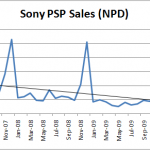Weekly News Roundup (23 May 2010)
As promised, the NPD analysis for April was put up first thing on Monday. Looking at the stats, it’s easy to come to the wrong conclusion that video games sales are dying in the US, but just like with Blu-ray sales a few weeks ago, the different timing of Easter in 2010 compared to 2009 has meant some weird month to month comparison data. If May turns out as worse as April, then you may begin to worry. In terms of guides, I’ve added a “new” TVersity Setup Guide. It’s not new of course because other guides that I’ve written before, like the PS3 H.264 Conversion Guide had already included TVersity setup instructions, but because so many guides had the same set of instructions, and some were updated and others were simply outdated, I thought it was a better idea to just combine all of these into one guide and then refer the other guides to this one. It will make updates much less painful, and I’ve also taken the time to add a few more tips to make the whole process a little bit easier. Anyway, let’s get on with the news.

In Copyright news, it was revealed that the MPAA spent $370,000 in the first quarter of 2010 lobbying the US government. That may sound like a lot, but it’s actually down from the previous quarter, and from a year ago.
Now, what this means, I don’t know. Maybe the MPAA is spending less because its members are making less (unlikely). Maybe they’re spending less because they’re not as concerned about piracy anymore (unlikely). Or maybe they’re spending less because the government is more in line with their thoughts that ever before, and so they don’t need to pay as much to get their way. Getting the FCC to buy their claim about TV DRM helping to get movies earlier on TV may have cost them the majority of these lobbying efforts, but it was surely worth the money. Of course, now that the FCC has agreed that movie studios gets to decide whether you can watch/record something or not on your own TV, the MPAA is not so sure that bringing movies to your TV earlier, which was the whole “benefit” side of the TV DRM coin, is such a good idea anymore. Cinema owners were always going to be against something which reduces their showing window, and while the MPAA has tried to shorten the window, they’re not going to do anything that endangers the cinema business, which is one of the few areas that has seen significant growth recently (thanks to 3D showings, mostly). So basically people will be stuck with TV with DRM, losing the ability to record stuff that they could before, and all for nothing in return. Nice one, FCC.

The Swedish Pirate Party has come to the rescue of The Pirate Bay by providing bandwidth for the BitTorrent index website
The MPAA had another victory during the week, against The Pirate Bay again, but as again, it was a minor and eventually inconsequential victory. At best. Last week, they got a German court to order the web host of TPB to cut off connections to the BitTorrent indexing website, and while it took a while for the web host, Cyberbunker, to agree, they eventually did it and TPB was down once more. And a day later (possibly less than this), it was up again. Hooray. And apparently, the Swedish Pirate Party has stepped up to offer hosting for The Pirate Bay, and so the next time the MPAA tries to shut down TPB, it will be a political issue, as well as a legal one. The Pirate Party is willing to defend the TPB, saying the website is “legitimate” and calling on Hollywood to end the “cat and mouse” games with the website. The Pirate Bay buys bandwidth from other web hosts, and so it’s very likely that the next step for the MPAA would be to go after the Pirate Party’s web hosts, which might effectively shut down both The Pirate Party website, along with the TPB, somethings that the courts may be a bit more reluctant to do. Or not.
Bringing together the previous story about the MPAA’s lobbying efforts and this latest attack on The Pirate Bay, US lawmakers published a report in which it identified The Pirate Bay as one of six “notorious” piracy websites, which also included file hosting website RapidShare. isoHunt, Mp3fiesta, RMX4U and even Chinese search engine giant, Baidu, were all named and shamed. Both RapidShare and Baidu were interesting inclusions. The latter being China’s version of Google, which begs the question, whether the real Google is next under the crosshairs of the US Congress (or perhaps its lobbying efforts have prevented it so far). It’s certainly true for a lot of people searching for pirated stuff, Google may be the first destination they visit, which usually allows them to find the relevant web pages on sites like The Pirate Bay or isoHunt. The thing is, if you’re going to go after indexing/linking websites like The Pirate Bay (who link, but do not host, pirated content), and because the Internet is all about one site linking to another, then Google may be just as guilty as The Pirate Bay or isoHunt, although it may be more “second-degree” linking, rather than the “first-degree” linking. But linking is still linking, and it once again highlights just the fine line between a legitimate business enterprise, and what the MPAA/RIAA considers the root of all evil. The RIAA welcomed the US congressional report, which is no surprise, considering their lobbying efforts probably paid for it.

RapidShare has been targeted by the US Congress for providing pirated content as it wins an important court victory this week
And while RapidShare was being targeted by the US Congress, they had better luck in the courts, as the District Court of California found them not guilty of copyright infringement in a dispute with copyright holders Perfect 10. It’s an important decision, which Perfect 10 might appeal, and this time highlights the fine line between file hosting and file sharing. There are lots of pirated content on RapidShare, but like image hosting websites, it’s really up to the user to decide how they use RapidShare, and most I suspect use it legally for sharing large files that wouldn’t get through most email servers. Certainly, as the webmaster of Digital Digest, I’ve observed lots of independent software publishers that use RapidShare to host their perfectly legal downloads, to save on bandwidth costs. Of course, there are also users who upload and download a lot of pirated content, and this is becoming a more and more popular route with the global clampdown on P2P services worldwide. Does RapidShare remove pirated content on request? They do. But are they able to ensure that pirated content never appears on their site? I think, with millions of uploads per day (probably), that’s going to be a tough task. I think the simple fact is that online piracy may be impossible to prevent, and if this is the case, then content owners need to think of other ways to combat it. I know they don’t want to use the word “compete”, and they are right in that why should they have to compete with people that break the law and don’t play fairly, but it’s reality and it’s something they need to accept as soon as possible, or risk missing out on the opportunities the Internet presents.
The US Copyright Group may be facing up to a legal battle with the Electronic Frontiers Foundation, as the non-profit digital rights advocates signal their intention to fight the mass litigation and pre-trial settlement mailings organised by the anti-piracy firm. The EFF is hiring lawyers which may seek to duke it out with the US Copyright Group in court over one of their mass litigation attempts, possible over The Hurt Locker. And then we’ll see if the US Copyright Group has the guts to go head to head in court with the EFF, or are they just in this to rake in the pre-trial settlement fees. The MTV website also revealed a couple of interesting notes about the producer of The Hurt Locker, Nicolas Chartier, noting a rather nasty correspondence between Chartier and someone who emailed in complaining about the mass litigation attempt. And yes, this is the same Nicolas Chartier that was banned from attending the Oscar ceremonies for breaking the award campaigning laws.
And finally, Sony says that piracy is the biggest problem for their troubled PSP portable games console. The April NPD analysis I linked to at the top does suggest that the PSP is in trouble, dropping a massive 44% in sales compared to April of 2009, and it has been steadily decreasing in sales for quite a while now. However, I don’t really buy Sony’s line that the PSP’s troubles are caused by piracy, even though I do believe their claim that piracy is robbing them of revenue. Nintendo a few weeks ago also complained about piracy on the DS as a revenue killer, and I believe them because DS piracy is notoriously easy, thanks to the easy availability of DS flash carts. But DS hardware sales are still going strong, certainly much stronger than the PSP (more than 6 to 1 margin in the latest sales figures). So how come the DS hardware seems to thrive despite piracy, and the PSP, which is actually harder to hack than the DS in terms of getting pirated games to work, is hurting so badly. The same goes for the PS3, which has not yet been fully hacked to allow pirated games to work, yet it it constantly being outsold by the Wii and Xbox 360, both of which are much easier to hack. I’m guessing that while piracy is an issue, it is not *the* issue, and that Sony needs to look inwards before they start blaming their own failures on others. Things like poorer pricing, poorer online experience, the very “young male” dominated marketing of both the PSP and PS3, as opposed to the more inclusive effort to get the casual gaming crowd, may all be contributing factors to the success and failure of each console.

Let’s move on to HD news. And by HD, that also includes 3D apparently because 3D is truly everywhere, and all the Blu-ray, HDTV manufacturers are releasing their 3D stuff around this time.
Cyberlink, the makers of PowerDVD, has posted an article on Tom’s Hardware which is essential reading for anyone who wants to know just how all this 3D stuff works, and what you’ll need to get it to work for you at home. Which reminds me that I should probably post something similar, since this is one area that I’ve been researching on a bit now because of my recent pre-order of a 3D TV. I would like to say that I did most of my research before I made the impulse buy, but that would be a lie. Although to be honest, I would have bought an equivalent model without 3D if one existed, which is becoming rarer as manufacturers are adding the relatively cheap to include 3D function into their top of the line TVs, which then allows them to raise prices. So if you want the best 2D quality, you’ll probably have to buy a more expensive 3D TV.
Google’s Chrome browser support H.264, Theora and VP8, so one might expect them to be neutral in the HTML5 video codec war. But they’re not staying neutral for long, as they launch WebM, the renamed VP8, to become an official open source competitor to the industry standard, but proprietary, H.264. Early testing, from the developers of x264, suggest that WebM, or VP8, isn’t as good as H.264, but that’s as to be expected considering how established H.264 is. It was also the developer’s technical, not legal, opinion that VP8 may fall foul of H.264 patent claims, something to keep an eye on for the future. But one thing is clear though, VP8 is better than Ogg Theora, and with both Mozilla and Opera supporting WebM/VP8, that’s probably that for Theora in terms of becoming the official HTML5 video codec, so we’re realistically now down to just two: H.264 and WebM.
But if you really must have H.264 on Firefox, then Wild Fox may be for you. It’s a fork in the Firefox development that will allow for H.264 decoding, as long as you’ve got a H.264 decoding codec installed on your PC. But its legal status may be under question, since this probably violates the H.264 licensing agreement in quite a few countries, while possibly staying perfectly legal in others.
As for gaming, there’s not much else going on except for the NPD analysis. E3 will be here soon, and Microsoft will unveil Project Natal proper, and then the Move vs Natal war will finally begin. Of course, fanboys have been fighting the same war for a while now, it will just go into overdrive come next month. Fun times.
And that’s all I have to say this week. More next week. Have a good week.

